Introduction
In this comparative research document, we attempt to analyze apps, websites, etc. in the social interaction space. We are somewhere in the area of social interactions within dorms (narrow) and finding belonging in your community (broad) with a special interest in getting people to know new friends. Hopefully, you can learn more about these platforms by reading our analyses!
Ananya
Nextdoor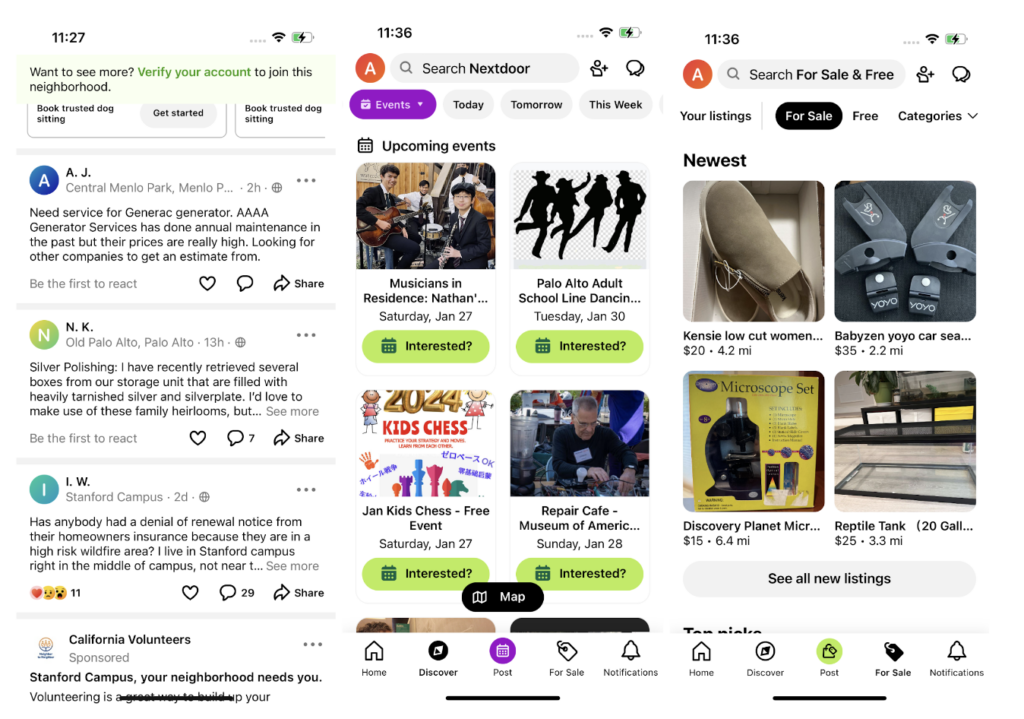
Nextdoor is an app that allows one to connect with people in their neighborhood (neighbors, businesses, non-profits etc.).
I feel that their target audience is pretty broad and anyone interested in getting to know what’s happening around them/connecting with people can join. I do feel it’s probably geared more towards those who are new to an area or might not know anyone around them. Upon checking the app out, the users do feel more on the older side.
Nextdoor does provide a good way to “feel” connected to those around you.
Strengths:
- Established user base and good reach
- They are available in 11 countries and about 315k neighborhoods globally
- Attempts to take care of the core desire of individuals to be connected with those around them
- Option to add emergency contacts
- Thinks about emergencies and how neighbors can promptly act in that situation
- Can use as an app or desktop site
- Completely free
Weaknesses:
- Not very user friendly, I struggled to verify my account and the instructions seemed very vague
- Upon using the app, it seems that it is moreso used to offer services/sell/give stuff/ask or give recommendations
- People mostly use initials and not their real names (I understand it is a privacy concern), but that makes it tougher to form a real connection
- Ends up feeling like a mix of reddit, supost, and an online community board
- Too many things happening at one place
- Can end up feeling overwhelming
- Too many things happening at one place
- Not even really good for maintaining or creating weak ties
- Ends up feeling like a mix of reddit, supost, and an online community board
How we will be different:
- We want to solely focus on individuals’ desire to be connected with those around them
- Stanford already has ways to sell stuff, so we do not need another one of that
- We do acknowledge it can be made by that by users, but we will try to not let that be our focus
- Stanford already has ways to sell stuff, so we do not need another one of that
- Easier process to sign up, get verified, and get started
- Focusing on smaller communities
- People in your dorm
- This might make people more comfortable in using their actual name rather than initials or an alias
- People in your dorm
Bumble BFF
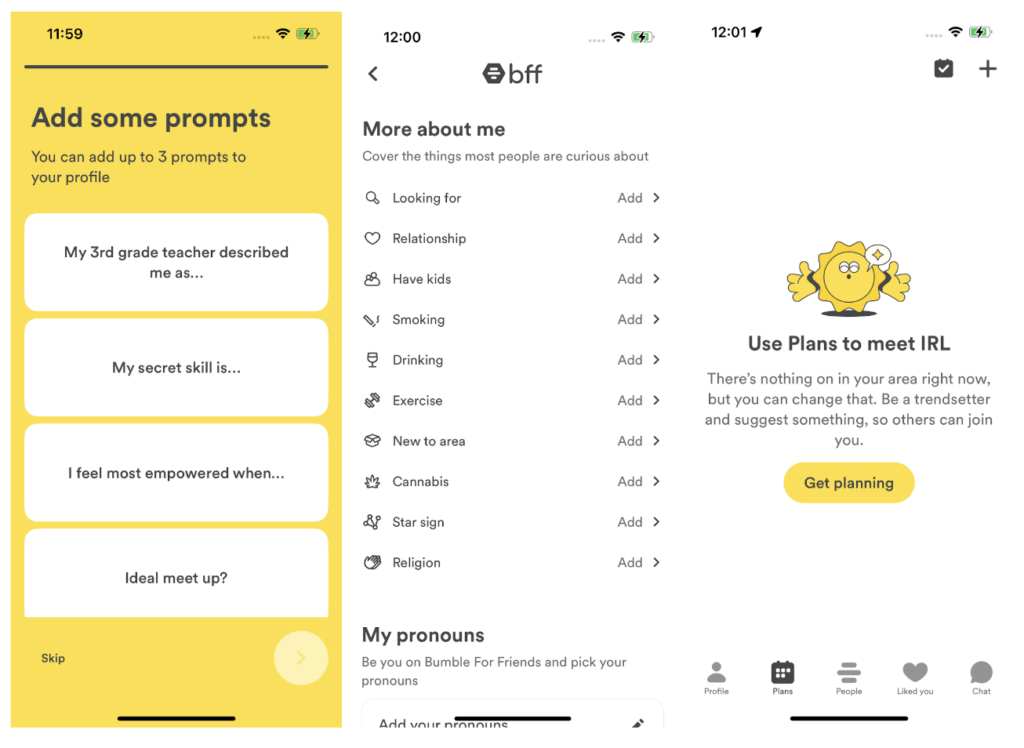
Bumble, but for finding friends – that is what Bumble BFF is. It uses location (just like Bumble) to help you find people around you who are also looking for friends. You can swipe left and right on profiles and get connected to people who swiped right on your profile as well (i.e you both are interested). It also has a feature to create plans to meet IRL (or to see plans people around you have made) – a way to get to know those around you in a non online setting (because the in person experience is always so different).
I feel like this is targeted towards the younger generation, specifically individuals looking to form strong ties.
Strengths:
- Can import some parts of your profile (photo, name etc.) from your Bumble account (if you have one)
- Good set of profile questions that people usually think about when looking for friends
- Easier to break the ice as you know the other person is also looking for friends
- Uses your location, so can easily update when you are traveling
- Clean and easy to use UI
- Option to get verified
- Just to confirm your photo matches you though
Weaknesses:
- No option to sign up with Google
- Has Apple, FB and phone number
- Google is the easiest and most used
- Adds friction to the sign up process
- Google is the easiest and most used
- Has Apple, FB and phone number
- Such apps always come with the fear of being catfished/scammed
- Not available on desktops (app only)
- What happens if no one matches with you?
How we will be different:
- Much less friction in the sign up process so that it is very easy to sign up
- Make it available on desktops as well (depending on what our users feel they need of course)
- Opportunity to be randomly connected with people (if both the sides have chosen that they would like to partake in that)
Anna
Hey! VINA
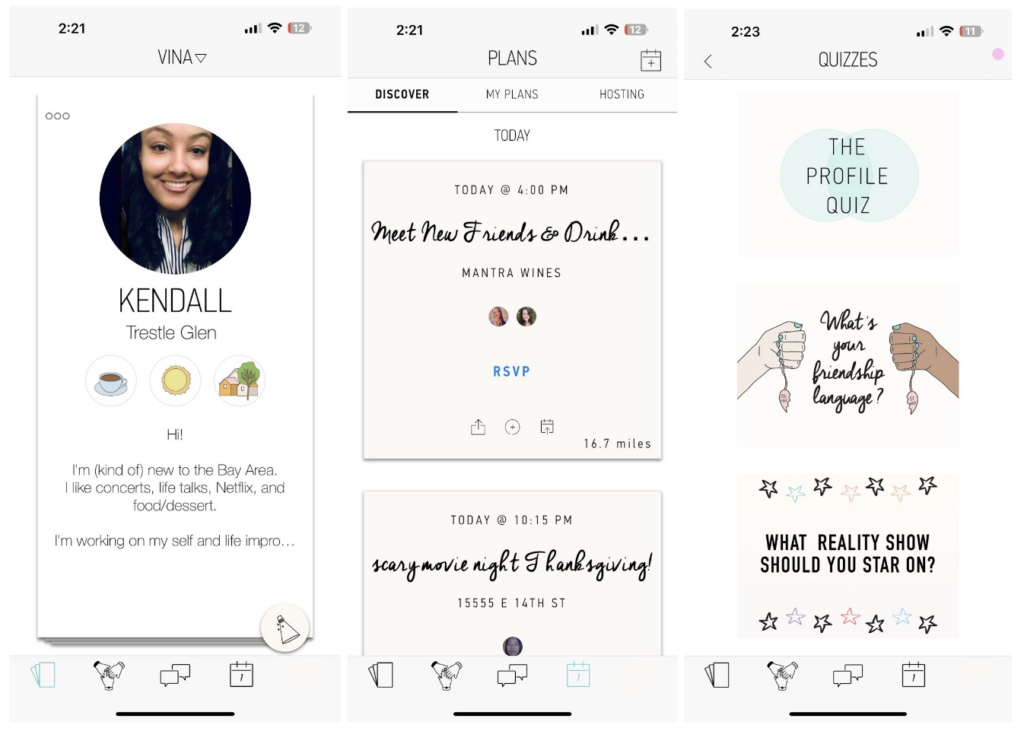
“Hey! VINA” is a mobile app designed for women seeking to make new friends. Users create profiles, specify their interests, and can then swipe through potential matches, similar to other social/dating apps. The app aims to facilitate connections between women who share common hobbies, activities, or lifestyles, providing a platform for building meaningful friendships. It is particularly useful for women navigating life changes, moving to new cities, or seeking companionship in various situations.
Strengths:
- Strong focus on friendship over dating
- Ability to take mini personality quizzes that add badges to your profile and contribute to more compatible friend suggestions
- Feature that allows you to host/plan events that others in your area can sign up for
- Chats begin with an “introduction” via a third-party from VINA (an automated message with a suggestion to meet up)
- Ability to filter profiles by your “communities”
Weaknesses:
- Few active users makes the pool of potential friends limited (runs out quickly) and using the live chat feature requires waiting for long periods of time
- Unclear what certain badges under a profile mean
- Inability to hide badges after taking personality quizzes
- Limited number of “communities” to label yourself with and no way to custom add your own
- Difficult to view profile photos besides the main one
How we will be different:
- Allow for flexible customization of profiles (make it easy to hide and add information)
- Avoid features that require having many active users
- Ensure all icons used are labeled
Yubo
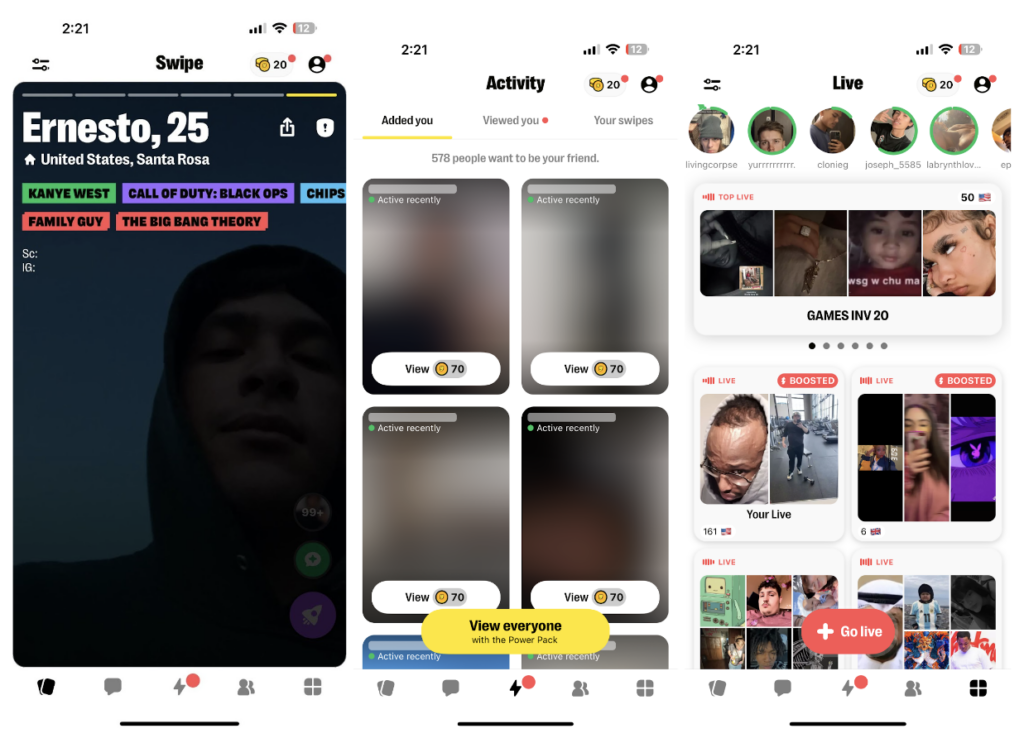
“Yubo” is a social networking mobile app designed for teenagers and young adults. The platform allows users to create profiles, connect with others, and participate in live video streams. Yubo focuses on providing a space for young people to meet and interact with new friends. Users can discover and join live video chats with others in their local area or around the world.
Strengths:
- Encourages people to upload more photos of themselves by limiting the profile information you are able to view (you must upload 4 photos of yourself in order to view more than 2 photos of each profile)
- Ability to specify gender preferences for your feed (eg. you can opt to only view women)
- Ability to ban or remove people from a live stream
- While it allows minors, it does not allow them to chat with adults
Weaknesses:
- Frequent ads throughout
- Seems to be more of a dating app than a friending app
- Live streaming is unmoderated, allowing for public bullying and harassment
- Overwhelming user interface makes it difficult to understanding how to use the app
- Many features require the use of in-app currency (to be purchased or acquired through watching ads)
How we will be different:
- Emphasize the purpose of the app (making friends)
- Focus on usability vs profit (no ads, completely free)
- Keep the UI as simple as possible
- Emphasize and enforce community norms
Nick
Strava
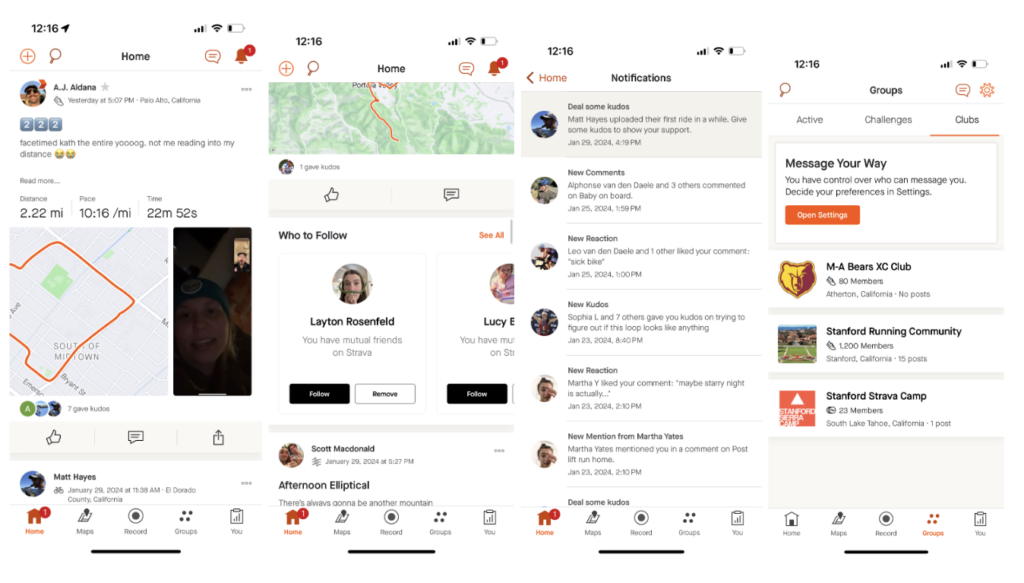
Strava is a social networking fitness app that allows users to share their workouts with their friends and communities. It also provides users with a GPS function to track their workouts on their phone, as well as import capabilities for users with their own preferred GPS devices. It tends to target people who are both socially inclined and physically active (or at least wannabes for either/both). I believe one of the problems it’s targeting is working out with others but not always having the time to go workout with those other people. It solves this problem by allowing users to post their activities with photos, comments, “kudos”, and the newly-introduced DM feature if you’re feeling frisky. I personally use strava and love it because it lets me see what all my close (and adjacent) friends are up to fitness-wise. It also motivates me to be more active throughout my day, helping me stick to workout plans when my friends give me kudos. I also feel more inclined to invite other friends to workout because it shows on Strava that we worked out together! I love commenting silly random things on my friends runs to prop them up or just have fun.
Strengths:
- Simple UI that makes sense
- Motivating and consistent color scheme
- Suggests friends who you might want to add (based on current circles?)
- Lets you keep track of the gear you use for different workouts: bikes, shoes, etc.
- Accurate GPS
- No dislike function, so you only spread positivity… also kudos instead of likes feels more wholesome and less social-media-is-eating-away-at-my-life-why-am-i-still-doom-scrolling-its-3-am
- Communities + challenges you can join
- Subscription that adds feature you might actually want
- Strava in review (copycat of spotify wrapped, but also motivating)
Weaknesses:
- For a while they didnt have a DM function which meant that if you didnt have your friends number, you couldn’t use the app to message them or share contacts other than through public comment sections
- Again i hate paying for apps, so i wish i had all the features for freeeeee
- Seeing how many kudos others get compared to me can make me feel less popular and sad
- Feel the need to impress and post content that will make me seem athletic to others
- Some features are only available on website and not mobile… like changing gear
How we will be different:
- Not pay to win
- Try to make sure the app encourages people regardless of how many likes someone has → maybe add ability to like but not show how many likes a person got? Just which of your close friends liked it
- Hopefully inspire users to not need to impress anyone on the app so they can ~be themselves~
Hoop
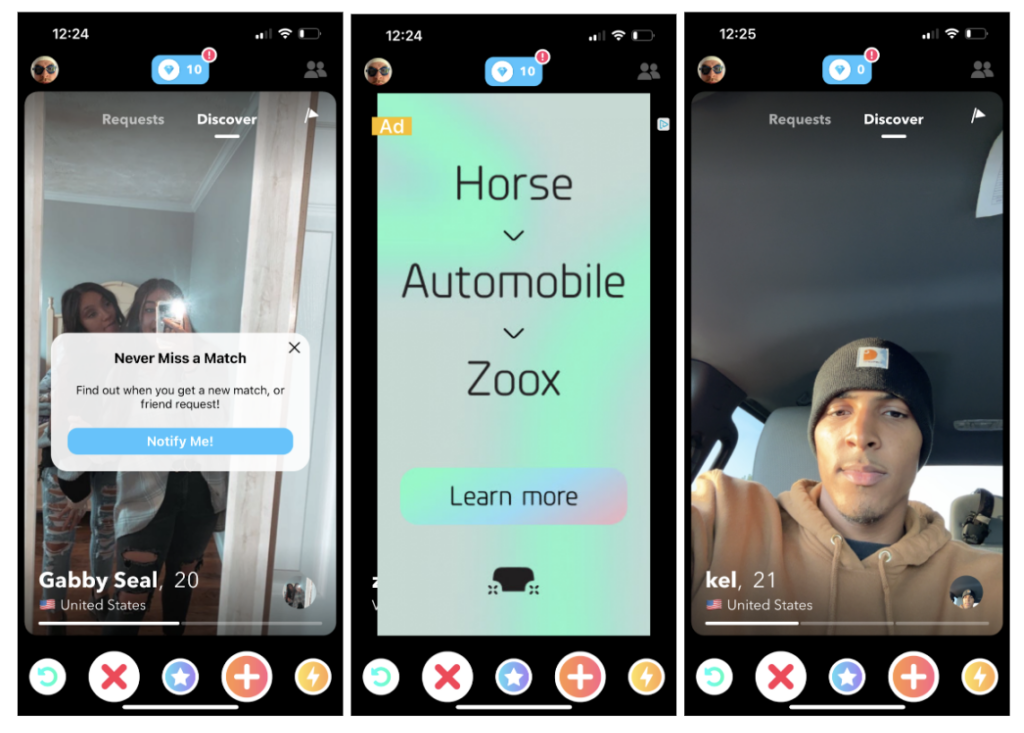
Hoop is a social networking (/dating?) app that allows you to see people’s profiles (similar to Tinder) and assign a binary yes or no to them on whether you want to be friends with them. It allows you to “find and make new friends” and allows you to get ahead by paying money to like people more than others who don’t pay. It mainly targets people who use social media, which I feel would skew younger, like 18-34 years old. It targets the problem of not knowing people in a local area and not relying on spontaneous interactions in physical locations. Their solution is to show you people in your area from the comfort of wherever you use your phone.
Strengths:
- Give the user a vast variety of choices of people to view
- Doesn’t let the person the user is deciding on know if the user wants to NOT be their friend (i.e. you can swipe past people you’re not interested in and it won’t tell them)
- User interface response time is quick
- Decent overall color palette
- App layout similar to other social apps like Tinder.
Weaknesses:
- Pay-to-friend sucks and I don’t know anyone who will ever pay for this. I certainly will not
- The app feels cheap… I don’t quite know what it is, but it feels like a knock off Tinder (and Tinder already feels gross). Maybe its the colors, or the photo quality, idk, or the poorly thought out layout
- You’re bombarded with ads every ~5 swipes that make you wait for 3 seconds
- I don’t get a chance to know anyone I’m swiping on
- I’m not “recommended” anyone to be friends with based on who I might get along with. I feel like a lot of the friends i make in real life come from sharing similar interests and theres not really a way to do that in this app
How we will be different:
- Allow people to add their interests if that ends up fitting the app type
- Make the app “feel good” to use. UI should make sense, should not feel cheap, should not feel gross, should not feel like a knock off of something else
- Not be a Tinder knock off for “friends”
Qi
Meetup
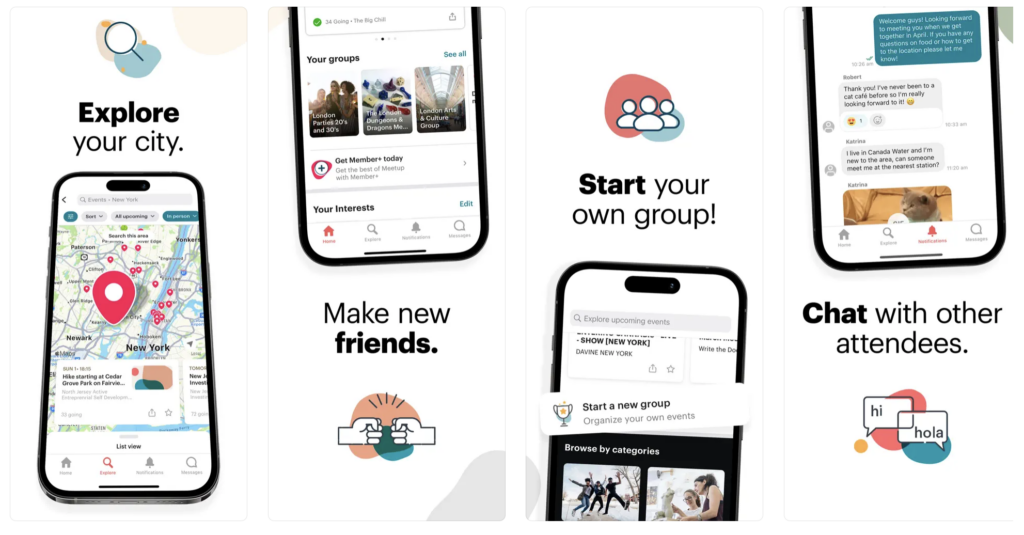
Meetup helps people pursue their interests with people who share them, both online and in person. With over 60 million members, Meetup helps users build a career network, discover a tech community, create a personal brand, make time for their hobbies, and meet friends with similar interests.
What problem are they trying to solve?
This APP is a great platform to inform people what events are happening around them.
What’s their solution?
The APP provides an intuitive user interface where the main page is a list of potential events the user might be interested in. There is also a message section in the menu bar at the bottom where people can either receive messages from the event or directly message people they know from an event within 24 hours.
Who is their target audience?
The target audience is people who want to get to know more people and/or join meaningful gatherings such as to explore hobbies or improve professional skills.
Who would be dedicated to this type of APP?
People who might be dedicated to this type of APP are people who consistently find the events interesting and are available to attend the events. There are a range of interest options users can choose from, so it might be easier for them to find niche events catered to their liking.
Strength:
- event-centered user interface
- easy to navigate
- the message has a separate page so it is convenient for people to talk to each other after an event
- the list of events can be sorted or filtered based on the user’s preferences
Weakness:
- some events are hardly attended and showing the small number registered might have scared potential users away
- too many pictures/symbols on one page, making it difficult to focus on a specific part
How we will be different:
- narrow the range and the type of events into dorm-based categories
- add more intuitive buttons to encourage users to exchange contact info
Befriend
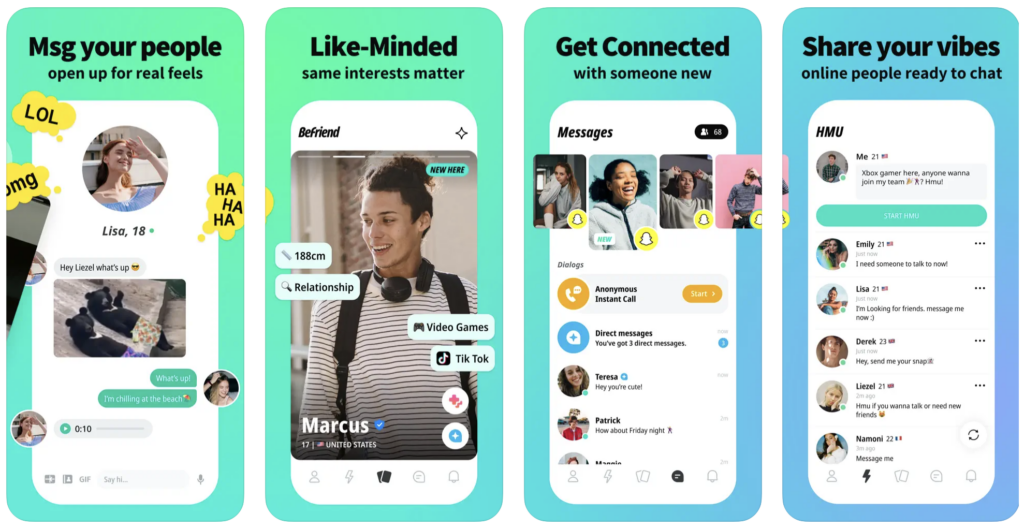
Befriend allows people to connect instantly with new friends through our seamless chat, voice, and video call features. Users can seamlessly connect their social media accounts and let their new friends know more about them. It uses the swiping feature that is common among social apps.
What problem are they trying to solve?
They are providing space for users to know more people.
What’s their solution?
Their solution is to use location to determine nearby people and recommend them on the main page to facilitate matches.
Who is their target audience?
Their target audience is people who are also actively looking for new friends who might share the same interests.
Who would be dedicated to this type of APP?
The dedicated audience would be people who have a consistent chat group/partner in the APP both of whom do not wish to change the platform for more communication.
Strength:
- The finding-nearby-people page is very intuitive to use, similar to Tinder’s left-right swiping scheme. It occupies the whole screen so everything looks big and clear.
- They also have a separate page called HMU where people can see posts and messages people right away for more spontaneous interactions.
- The overall design is very organized and clean
Weakness:
- There is not too much space for people to customize their preferences unless they search for their interests or train the recommendation algorithm after they perform a few selections.
- The swiping left and right feels too similar to a dating APP. It might misguide people from starting to make friends first, deviating from what the APP’s name conveys.
- Security measures are not placed during account registration.
How we will be different:
- Streamline the account registration process so it is smooth and ensures the safety of the existing community members
- The function of finding people nearby could show a relative distance metric for people so that they could set the distance threshold to their own comfort level.
A map that positions the APPs we test
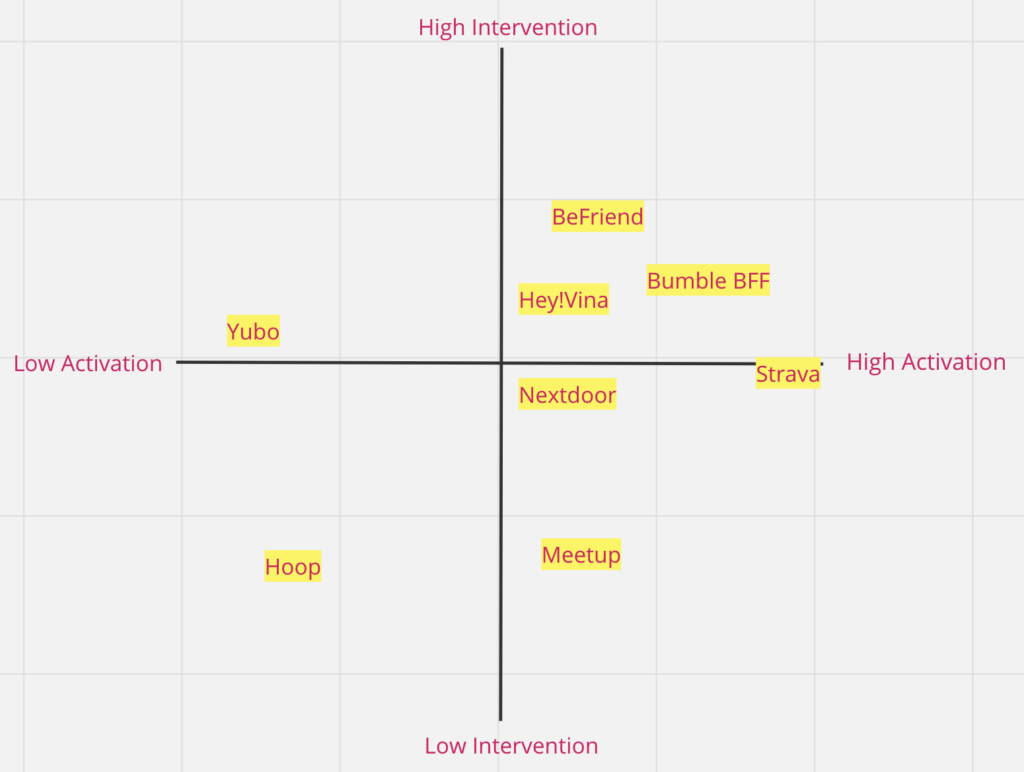

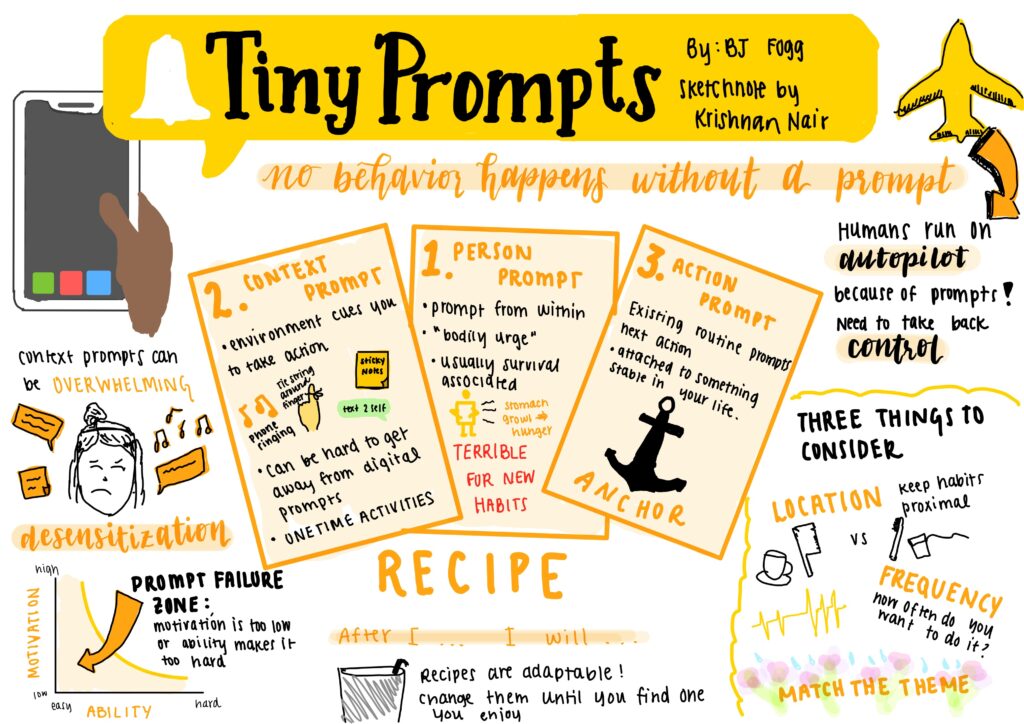
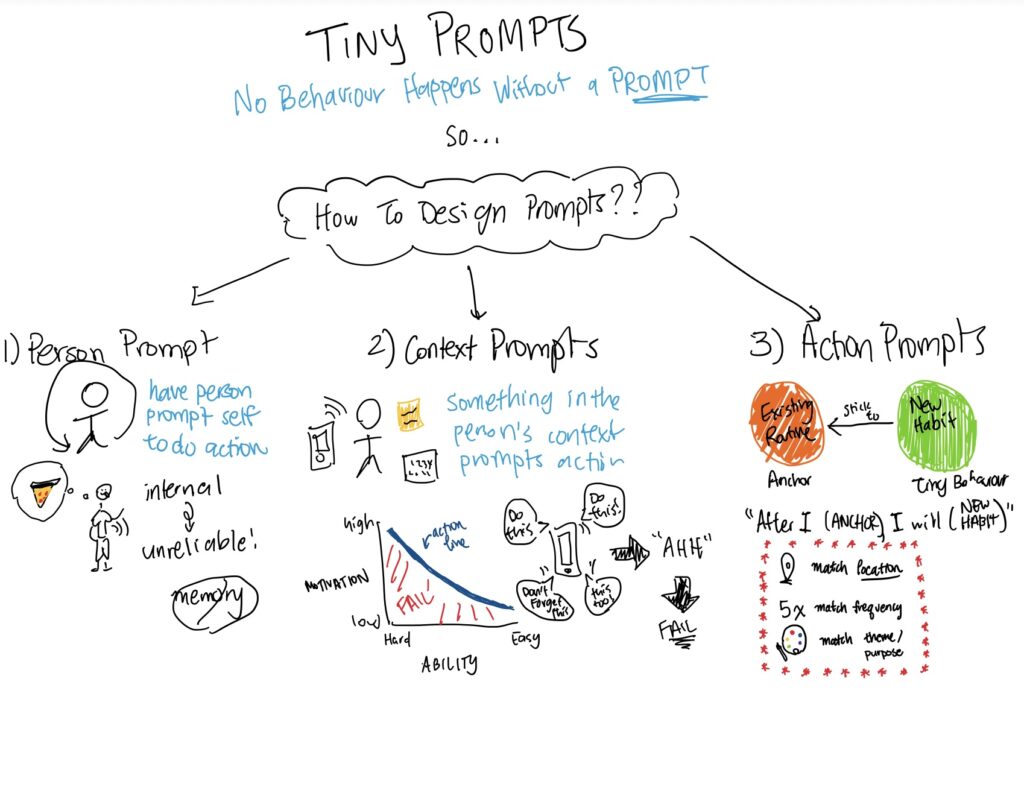
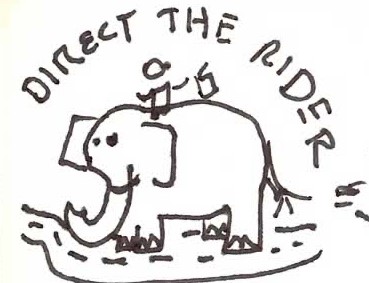
Comments
Comments are closed.